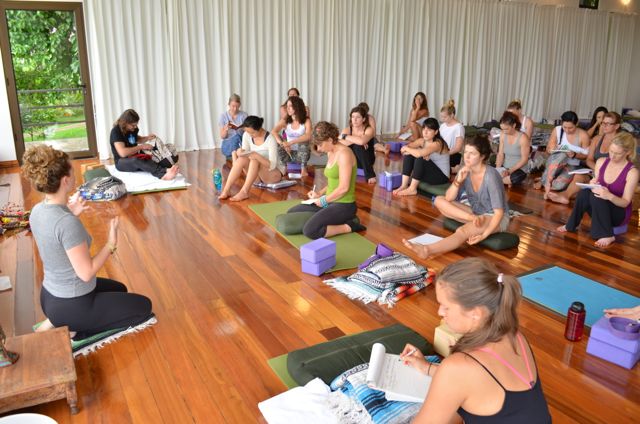Yoga teacher training is a big commitment.
I’m not talking about dedication to the study and practice, for lovers of yoga those come easily. Yoga teacher training is a big commitment financially.
Yoga teacher trainings range from $2,000 to $5,000 for training in local hometown studios that only provide the training program and $3500-$6,500 for all-inclusive destination-based training intensives that include meals and lodging…what are we really getting for our money?
While organizations such as Yoga Alliance do a good job of setting general guidelines, they are just that—guidelines that can be interpreted in many different ways. And, the reality is the majority of those to enter a Teacher Training Program only do so once so they have no other program to compare it to.
Here’s my recommended list of questions to ask before committing financially:
1. Will there be more than one teacher?
While that is not to say that one teacher is necessarily a bad thing, one instructor for 180 “contact” hours (Yoga Alliance’s definition of a teacher with a certain credential in the room providing instruction) means you will be only benefiting from that one instructor’s perspective and experience.
You may be tempted to sign up for a Teacher Training at your favorite studio because your favorite instructor is leading it, however you may find that your are limiting your educational experience. We gain as much from instructors who challenge our ideas of yoga as the ones that we align perfectly with philosophically and practically.
2. Who is teaching which classes?
Find out specifically who will be teaching and how many hours those teachers will actually teach. If the program limits the number of hours more experienced instructors teach you may not be getting your money’s worth. If it is a Yoga Alliance training, you will want to make sure that the E-RYT 500 instructor is teaching the majority of hours.
3. Can you speak to the primary teacher and prior students?
It is a good idea to speak with the teacher leading the training before you commit if that person is available. Unless you are studying with famous instructors, who you likely will not be able to speak to beforehand, see if you can chat with the primary teacher to get a feel for if studying under their tutelage is right for you. Ask also to speak to two or more prior students.
Let’s face it, even after completing a yoga teacher training that was below par, most students still have a wonderful experience committing to the practice intensely while bonding with other yogis. Ask specific questions to try to get them to open up about the level of educational experience the program offers.
4. Is the instructor experienced in the particular facet of yoga that interests you?
If you sign up for a Teacher Training expecting to get a lot of anatomy and half way in you discover that the subject is only touched on briefly or that it is taught from a yogic anatomy perspective rather than medical anatomy perspective you may be disappointed.
5. How many in-class instruction hours of teaching will you get and how does that align with their published schedule?
The number of classroom hours vary widely from teacher training program to the next. If it is a Yoga Alliance training, ask specifically how your will be getting your 180 hours? Some teacher training intensives offer a 200-hour program in three weeks, with a day off each week. The math just doesn’t add up unless you consider eating, sleeping and showering as “yoga practice.” You will need at least four weeks to fit the hours in. If the program is not Yoga Alliance, 180 hours of classroom and practice time is a good guide for what you should expect.
6. How many students on average are accepted into the teacher training and is there a maximum number?
If there are more than 20 students attending any one teacher training, the amount of personal instruction and ability to ask questions will be severely limited. Numbers of students will influence the training dynamics: too few students and the training can lack energy and diversity, 20 or more and cliques start forming, which can lead to exclusion of some.
7. What is required to pass the teacher training and receive a certificate?
Most programs have an exam at the end of the training whether written, teaching, or both. Most programs will require you to attend all classes. If you get sick, or other life commitments come up you may not be able to complete the entire teacher training. Ask how many hours are allowable to miss, and if you go over that number, how can these be made up?
Finding out what the graduation requirements are will go a long way to finding a training that meets your expectations.
8. What are the payment terms and cancellation policies?
Ask about payment terms and how they may be refunded in the case of cancellation. While deposits are often non-refundable as a standard, some programs allow you to apply the deposit to a future training. Other payment terms may vary widely from one training to the next and depend on if the training takes place at your local studio or at a resort location for intensive, destination-based trainings.
9. Do they offer scholarships, work-ttudy programs or payment plans?
If you do not have the cash to invest, what other options are out there? Remember, the earlier you sign up the more likely that scholarships, work-study or payment plans are available. Most programs also offer discounts for early sign-up. Do not wait to the last minute or you will be forking up the entire sum at once.
10. If the teacher training is an intensive program, taking place in four weeks, usually at a domestic or international resort rather than your hometown, find out how much lodging and meals cost.
Intensives can have many advantages, and offer a one-of-a-kind experience; however, they tend to be more costly as lodging, meals and sometimes excursions are often included. Find out what accommodation and meal options are available. Also ask if they can accommodate specific dietary needs: vegan or gluten free, for example.
Relephant read:
The 10 Things We’ll Never Tell You in Yoga Teacher Training (But Should).
Author: Whitney Villalobos
Editor: Catherine Monkman
Photo: Author’s Own












Read 0 comments and reply